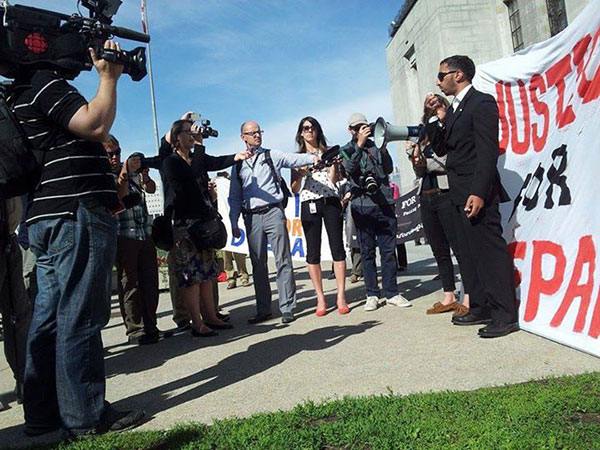For many Canadians, being 24 means working long hours, enjoying friend-filled weekends and even experiencing the wonders of travel.
For Ottawa-born Deepan Budlakoti, being 24 means making court appearances to prove he is Canadian. Budlakoti is awaiting judgment on a rare legal case that has rendered him stateless for over a year -- one that he says has left his life in complete disarray.
"The biggest impact [is] being stressed, not sleeping well, going into financial debt. Basically losing everything," says Budlakoti. "You're completely messed up after, you don't have a normal life."
Depending who you ask, Budlakoti was either issued citizenship documents in error or is being exiled from his birth country for having a criminal record. Though far from innocent, Budlakoti's case foreshadows what power Bill C-24 will have over dual citizens.
Born in Canada
Budlakoti was born in 1989 to parents who migrated from India to work for the Indian High Commission in Ottawa -- though his parents weren't under the employ of the High Commission when Budlakoti was born.
Declared a Canadian citizen because he was born in Canada, Budlakoti says he had a Canadian passport on two separate occasions.
This changed in 2009 when he was convicted of a break-and-entry charge, following several run-ins with the law. While being held in prison, Budlakoti was informed by the Canadian Border Services Agency (CBSA) that a mistake had been made in issuing him citizenship. According to Budlakoti, all of his citizenship documents were taken away from him, save his birth certificate.
Classified as a long-term permanent resident and gradually downgraded through the ranks as his prison sentence was confirmed, Budlakoti was eventually declared stateless and the legal process to deport him began.
Though his deportation was stopped by the public safety minister at the time, Budlakoti is to this day stateless: India confirmed in 2013 it would not issue Budlakoti a travel document because he is not a citizen. Children of Indian-born citizens can get citizenship, but Budlakoti is not eligible for this because children have to be registered within their first five years; Budlakoti's parents were under the assumption that being born in Canada meant that Budlakoti was Canadian.
Citizenship and Immigration Canada (CIC) holds that Budlakoti is not a citizen because according to the 1977 Canadian Act, "children of foreign diplomats born in Canada [are excluded] from Canadian citizenship unless one of the parents is a Canadian citizen or permanent resident."
'I paid my dues'
Budlakoti has since presented evidence that on his date of birth, his parents were not employed by the Indian High Commission, having left the job four months before he was born.
The CIC and CBSA did not respond to Guidebook's request for an interview, but both forwarded statements confirming his deportation is being processed on the basis of his criminal background.
According to Alexis Pavlich, press secretary with the CIC, "this convicted criminal has never been a Canadian citizen. He should not have chosen a life of crime if he did not want to be deported from Canada. Mr. Budlakoti is being removed from Canada for 'serious criminality.' He served significant jail time for trafficking both weapons and drugs."
Pavlich goes on to admit that while Budlakoti was born here, "he did not automatically become a citizen. In fact, he was part of an application for permanent residence in 1992. This would not have been necessary had he been a Canadian citizen at the time, but no application for citizenship was ever made by him or on his behalf."
Civil rights groups are calling foul for using citizenship law to discipline a Canadian-born criminal. Charlotte Kingston, communications manager at the British Columbia Civil Liberties Association (BCCLA) says, "In 2013, when the Indian High Consulate confirmed that his parents were not employed at the time of his birth, that really should have been the end of the problem. That should have been more than enough to confirm his citizenship."
"We can speculate for a lot of reasons about why they might be continuing to make his life this difficult. Certainly we think it's not a coincidence that his citizenship only came into question after he had some run-ins with the law, and we think that that's totally unacceptable. A conviction is not a reason to revoke someone's citizenship," adds Kingston.
Budlakoti says he feels like a victim of double punishment. "I committed an offence, I paid my dues to society, I did my time, just like anyone else would," he says. "I'm born in Canada, it's irrelevant that I got into trouble. I'm born in Canada, I lived here my whole life and that's the bottom line."
"If you actually look at it, I was Crown ward at age 12," he continues. "I lived with the CAS [Children's Aid Society], so the state was my parent essentially at a young age." Budlakoti ran away from home as a youth.
"I'm essentially their project. They're the ones that raised me and this is how I became. But now they're trying to deport me from my country," he adds. "I'm trying to move on with my life, but they're not letting me do that."
Implications of Bill C-24
Beyond Budlakoti's case is a larger debate about who decides who can and cannot be a Canadian citizen -- an issue that has been heating up since Bill C-24 was passed into law on June 19.
Among the more contentious points of the Strengthening Canadian Citizenship Act is the amendment that the citizenship and immigration minister will have the right to revoke any dual citizen's Canadian citizenship for a host of reasons.
Even dual citizens born in Canada could be deported if found guilty of serving as a member of an armed force of a country or as a member of an organized armed group that was engaged in a conflict with Canada. According to Citizenship and Immigration Minister Chris Alexander, there are more than 130 known Canadians involved in extremist activities abroad.
The government also reserves the right to revoke citizenship from dual citizens convicted of treason, terrorism, spying or other offences under the National Defence Act.
Budlakoti's case foreshadows this new direction in citizenship law. While the government appears to be revoking the privilege of citizenship from newcomers with dangerous backgrounds, it is more accurately shirking Canadian-born responsibility for political reasons, rather than judicial reasons, according to the BCCLA.
Kingston of the BCCLA says, "We believe very strongly that it shouldn't be up to bureaucrats to decide someone's fate, particularly to decide their citizenship status or to have the power to revoke it. So that's why its really important that Deepan in this instance will have the opportunity to go through the process and to have that determination made by a judge and the judicial system."
In all of this, Budlakoti says he has struggled to escape the shadow of his past and present situation -- even the job he managed to get in November with a construction company was lost when his employers heard of his ambiguous status. Supported by a wide range of civil liberties groups such as No One Is Illegal and Solidarity Across Borders, Budlakoti awaits a court decision which, based on the judge's previous record, could arrive anytime between now and September.
Hopeful the decision will be in his favour, Budlakoti has taken his fight to the United Nations, arguing Canada has violated international law by rendering him stateless. So far, the international body has not heard Budlakoti's case in court.
A version of this story first appeared in Guidebook Magazine. ![]()
Read more: Rights + Justice
















Tyee Commenting Guidelines
Comments that violate guidelines risk being deleted, and violations may result in a temporary or permanent user ban. Maintain the spirit of good conversation to stay in the discussion.
*Please note The Tyee is not a forum for spreading misinformation about COVID-19, denying its existence or minimizing its risk to public health.
Do:
Do not: